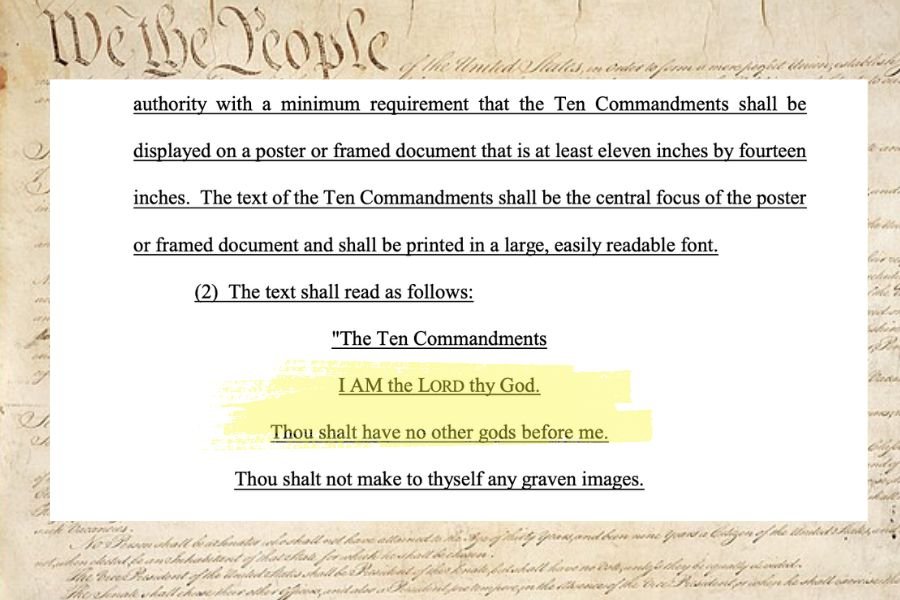On June 19, 2024, Louisiana governor Jeff Landry signed a new law requiring that the Ten Commandments be displayed, in “large, easily readable font,” in every public school classroom from kindergarten to state-funded universities. The move prompted an outcry from Americans citing the first amendment clause that the government “shall make no law respecting an establishment of religion, or prohibiting the free exercise thereof.”
Defenders of the law contend that the Ten Commandments are not solely religious in nature, and the language of the law refers to them as “foundational documents of our state and national government.” But the ACLU and other civil rights organizations immediately announced that they would fight the law in the courts. A similar law in Kentucky was struck down as unconstitutional by the U.S. Supreme Court in 1980.
Author and attorney Andrew Seidel took to X to argue why the law is not only unconstitutional, but un-American.
Seidel begins by sharing that the first commandment in the specified text that the law requires be posted in classrooms states, “I AM the Lord thy God. Thou shalt have no other gods before me.”
“The point of this bill is to give the false impression that America is a Christian nation,” Seidel wrote in his thread. “That’s Christian Nationalism.”
Seidel says that the first commandment directly conflicts with the founding principles of the United States.
“No law—and this would be a law—can tell an American to worship a god, let alone which god. Americans are free to be godless (as a growing number are), or, if they wish, to worship every god from every holy book.”
He pointed to the law’s sponsor, Rep. Dodie Horton, stating in her explanation of why she proposed the bill: “I’m not concerned with an atheist. I’m not concerned with a Muslim. I’m concerned with our children looking and seeing what God’s law is.”
In addition to the establishment of religion as a constitutional problem, Seidel shared that the Louisiana law uses an edited version of the Ten Commandments in the text that the state specifies.
Seidel explained that there are various translations and interpretations of the Ten Commandments, and that such differences have been the basis of different schisms within Christianity itself, not to mention “as James Madison put it, the ‘torrents of blood’ that have been spilled, trying to impose a state-sanctioned version of religious truth.”
“That’s what Louisiana is doing here,” Seidel wrote. “Imposing it’s version of religious truth on kids in public schools. It’s gross.”
Seidel then explained the issue with Louisiana’s editing of the King James Version of the Ten Commandments, paring it down and removing certain phrases.
“If the state can rewrite one religion’s holy book, it can rewrite yours. Louisiana does not have this power. Nor does it have the power to impose that religious edict on a captive audience of your children.”
“This is the worst kind of big government conservatives claim to oppose,” Seidel added. “More to the point, this is one reason we have the separation of church and state, and it’s precisely how that separation protects everyone and helps ensure the foundational value of religious freedom. It not only prevents the state from weighing in on religious disagreements, scriptural discrepancies, and theological debates, but also refuses to empower the state to force its preferred scripture or religious doctrine onto we the people.”
Imagine if a state legislature with Muslim or Hindu or Buddhist-majority decided that an excerpt from one of those faith’s holy books prohibiting the worship of any other deities was required to be posted in every public school classroom. The same people who are pushing for and praising this law probably wouldn’t stand for it.
Opponents of the Louisiana law argue the idea that the U.S. was founded on the principles found in the Ten Commandments is negated as soon as you put the first commandment up against the first amendment. The U.S. was largely founded on the principle of religious freedom. The first amendment prohibits the government from telling the people what to believe or whom or how to worship. The first commandment specifically states whom the people must worship, and the second, third and fourth commandment specify how they should worship and there therefore incompatible as government-sanctioned messages.
Virtually no one is arguing that all of the Ten Commandments are bad. Not killing, lying or stealing are standard moral codes for the vast majority of humanity, regardless of religious background. But the others are very much asserting Judeo-Christian religious beliefs, and Seidel says for the government to require that assertion in classrooms is blatantly unconstitutional and un-American as well.
You can find Andrew Seidel’s books, “The Founding Myth: Why Christian Nationalism is Un-American” and “American Crusade: How the Supreme Court Is Weaponizing Religious Freedom” on Amazon.
As a participant in the Amazon Associates affiliate program, Upworthy may earn proceeds from items purchased that are linked to this article, at no additional cost to you.






























